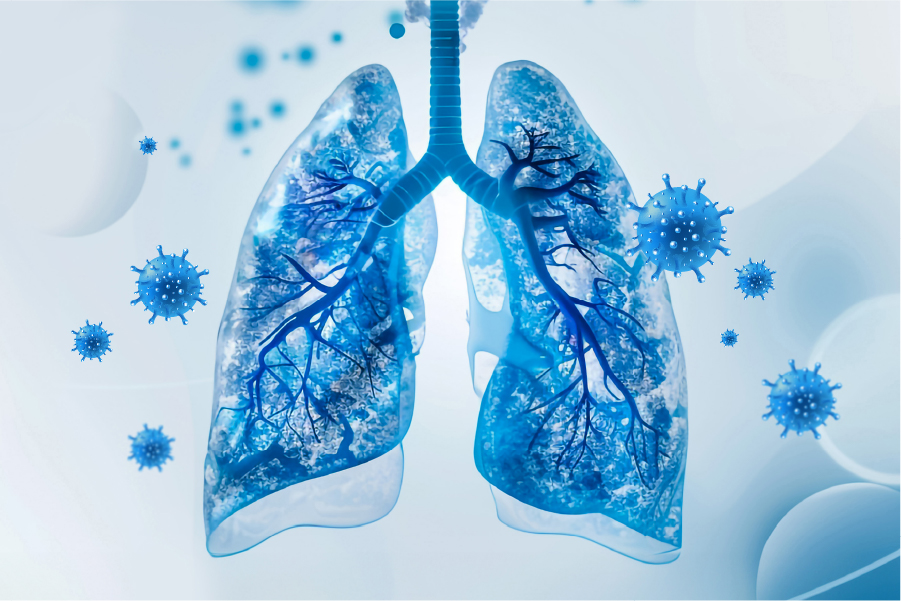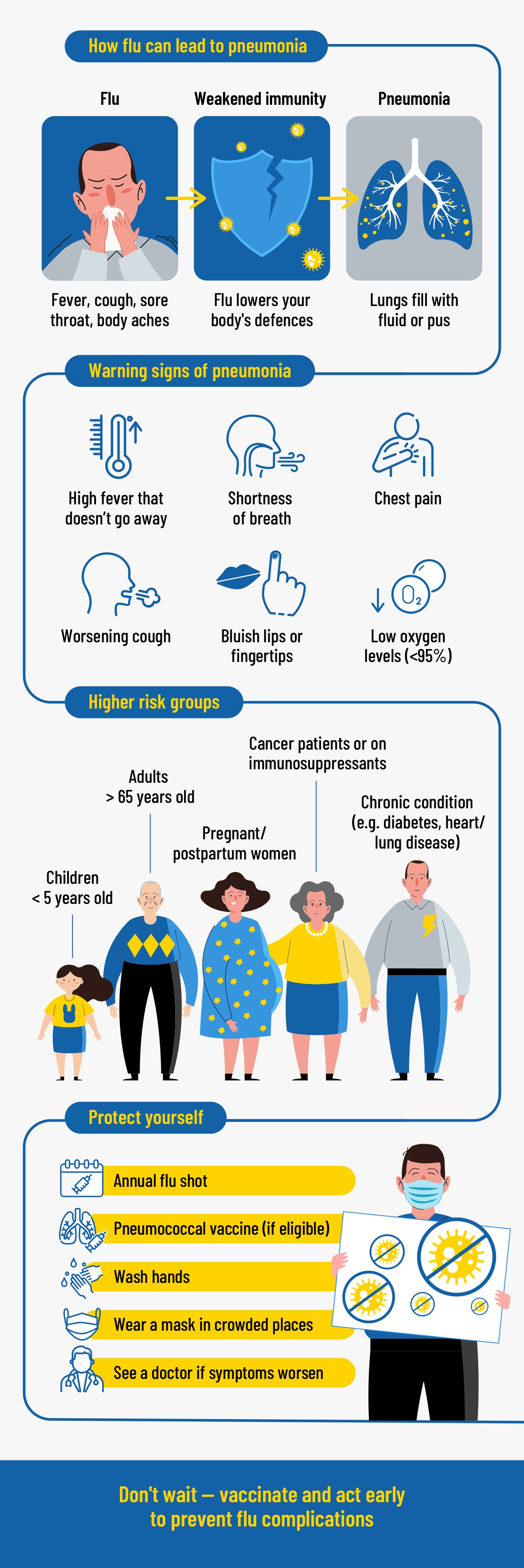Influenza is common, but in some cases, it can progress to pneumonia.
Understanding the risks and getting vaccinated can help prevent
complications and reduce the likelihood of hospitalisation.
Issue 8 | March 2025

 Subscribe and ensure you don't miss the next issue!
Subscribe and ensure you don't miss the next issue!
In February, the passing of a popular Taiwanese artist from influenza-related pneumonia was a reminder that what often begins as a routine case of influenza, or the flu, can sometimes take a dangerous and even fatal turn.
For most, influenza is a temporary ordeal, bringing fever, body aches, congestion and fatigue before recovery within a week. However, in some cases, the infection worsens, progressing into pneumonia. In Singapore, the condition is the second-leading cause of death after cancer, according to the Ministry of Health.
How does a common flu infection escalate into something so severe? More importantly, how can it be prevented? Dr Valencia Lim, Consultant, Division of Respiratory & Critical Care Medicine, Department of Medicine, National University Hospital (NUH), highlights the risks, warning signs and the importance of timely vaccination as one of the most effective ways to stay protected.
When influenza turns into pneumonia
Pneumonia is a serious lung infection that occurs when air sacs in the lungs become inflamed and fill with fluid or pus, making breathing difficult. It can be caused by viruses, bacteria or fungi — with influenza being one of the more common triggers.
Flu-related pneumonia develops in two ways. “The flu virus can infect the lungs directly, causing viral pneumonia,” Dr Lim explains. “Alternatively, the flu weakens the immune system, making it easier for bacteria to infect the lungs, leading to bacterial pneumonia.” Secondary bacteria pneumonia can occur in up to 20 percent of people with influenza.
Pneumonia symptoms can range from mild to severe. In its early stages, it may feel like a lingering flu or cold, with persistent cough, fever and fatigue. However, as the infection worsens, symptoms become more serious. “Shortness of breath, chest pain, low oxygen levels and high fever that does not improve after a few days are warning signs that indicate a need for prompt medical attention,” says Dr Lim. “Especially if symptoms are worsening, or not improving, despite treatment.’
While anyone can develop pneumonia, certain groups are at higher risk. Children under five years old and older adults above 65 years old are particularly vulnerable due to weaker immune responses. Other groups of individuals who are more susceptible to being infected includes pregnant women; those with chronic medical conditions (such as diabetes, heart disease or lung disease); those undergoing cancer treatment; and those on immunosuppressive medications.
“Even a common cold can lead to pneumonia. Bacteria can take advantage of the body’s weakened immune system and cause significant harm,” adds Dr Lim. “If symptoms persist beyond a week or worsen instead of improving, it’s important to seek medical attention.”
Prevention is better than cure
One of the most effective ways to reduce the risk of developing flu-related pneumonia is through vaccination. Because the influenza virus evolves constantly, flu vaccines are updated yearly to match circulating strains. Receiving an annual flu shot significantly lowers the likelihood of severe flu complications, including pneumonia.
“It takes about two weeks for the vaccine to take effect, so it’s best to get vaccinated before the flu season or at least two to four weeks before travelling,” Dr Lim says. In addition, pneumococcal vaccination is also recommended for older adults and individuals with chronic conditions to provide further protection against bacterial pneumonia, which tends to be more severe.
Of course, good hygiene practices remain essential in preventing infections. “The Covid-19 pandemic has shown us that frequent handwashing, using alcohol-based sanitisers and wearing a mask in crowded places can reduce our exposure to respiratory viruses,” adds Dr Lim. “It is also important to seek medical care early, so that timely treatment and intervention can help reduce the risk of severe life-threatening complications.

Like this article? Simply subscribe to make sure you don't miss the next issue of EnvisioningHealth!





















